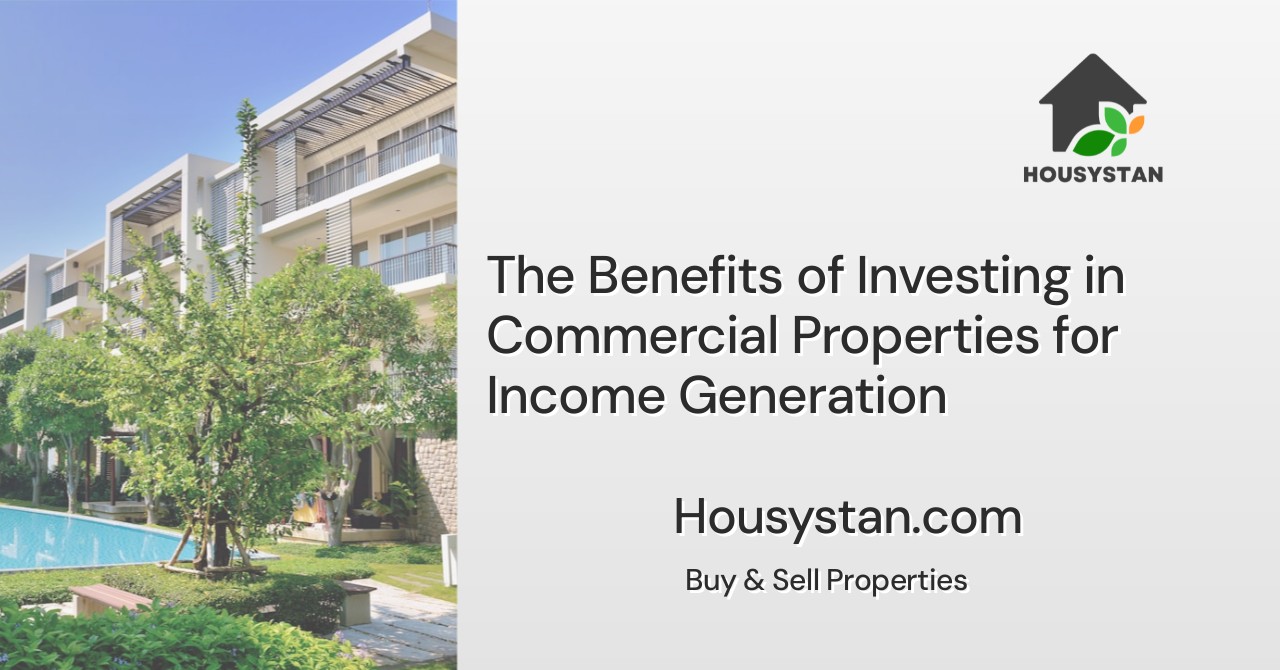The Benefits of Investing in Commercial Properties for Income Generation
Read latest blogs and articles from Housystan

The Information mentioned here was last updated on:
29/1/2026Unveiling the Benefits of Investing in Commercial Properties for Income Generation
Investing in commercial real estate can be a powerful way to create substantial income streams and build long-term financial security. While residential property investment often gets the spotlight, commercial properties offer unique opportunities that are worth exploring. In this blog post, we'll delve into the benefits of investing in commercial real estate, making it easier to understand for the everyday reader.
Understanding Commercial Property Investment
- Verified Tenants/Buyers
- Unlimited Property Listing
- Zero subscription/charges fee
Before we dive into the benefits, it's helpful to clarify what commercial property investment means. Commercial real estate includes office buildings, shopping centers, warehouses, hotels, and other non-residential properties. Unlike residential properties that are primarily lived in, commercial properties are intended for business activities and public interactions.
Commercial real estate investment has been an engine for wealth creation. The right properties can offer impressive returns on investment (ROI) and enhance financial portfolios. Here’s why:
Key Benefits of Commercial Real Estate Investments
1. Higher Income Potential
- Attractive Rental Yields: One of the significant advantages of commercial properties is their potential to offer higher rental yields compared to residential properties. This is mainly because businesses are typically more willing to pay higher rents for ideal locations and state-of-the-art facilities.
- Longer Lease Terms: Unlike residential leases that usually last for a year, commercial lease agreements often range from three to ten years. This stability ensures consistent income and reduces the vacancy rate risk.
2. Diversification and Risk Management
- Portfolio Diversification: Adding commercial properties to an investment portfolio can significantly diversify an investor's assets. This diversification helps manage risks better as the real estate market and business sector don't always move in tandem with the stock market.
- Multiple Industry Exposure: By investing in various types of commercial properties, from office spaces to retail stores, investors can gain exposure to different industry sectors, further mitigating risk.
3. Capital Appreciation
- Property Value Growth: Over time, commercial properties can increase in value, especially in prime locations where demand is high. Investors benefit not only from rental income but also from the appreciation of the property value itself.
- Inflation Hedge: Real estate traditionally serves as an excellent hedge against inflation. As the cost of living goes up, so do property values and rental income, protecting the investor’s purchasing power.
4. Tax Advantages
- Depreciation Benefits: Commercial property owners can take advantage of depreciation, an accounting technique that allows them to deduct the cost of the property over time from their taxable income.
- Tax Deductions: Many expenses related to managing and maintaining commercial properties, such as mortgage interest, property taxes, and repair costs, can be tax-deductible.
Getting Started with Commercial Property Investment
1. Research the Market
Understanding market trends is crucial. Potential investors need to evaluate which types of properties are in demand and in which locations. Researching local economies, population growth, and business activities provides valuable insights into promising investment areas.
2. Assess Financial Capability
Before investment, consider how much capital is available and whether financing options like commercial mortgages are feasible. It's also essential to plan for unexpected expenses such as repairs or upgrades, ensuring you have adequate savings or a financial buffer.
3. Partner with Professionals
- Real Estate Agents: Agents specializing in commercial properties can offer valuable guidance and access to property listings that fit your investment criteria.
- Financial Advisors and Legal Experts: Consult with advisors to align your commercial real estate investment with your overall financial goals and ensure you're adhering to all legal requirements.
4. Consider Property Management
Commercial properties often require more intensive management due to tenant demands and maintenance requirements. Hiring a professional property manager can relieve the burden, allowing you to focus on strategic investment decisions.
Key Factors to Consider in Commercial Property Investment
1. Location
- Accessibility: Properties situated in highly accessible areas with good transportation links attract more tenants.
- Surrounding Amenities: Nearby facilities such as restaurants, banks, and other commercial establishments increase a property’s appeal.
2. Tenant Quality
- Credit-Worthy Tenants: Leasing to established and reputable businesses ensures a dependable income source. Investigating a potential tenant’s financial stability beforehand is advisable.
- Tenant Mix: A diverse range of tenants from different industries can protect against sector-specific downturns.
3. Building Condition and Maintenance
Investors should perform thorough inspections to assess the condition of the property. Up-to-date facilities are more attractive to potential tenants and may require fewer immediate upgrades or repairs.
Navigating the Challenges
While commercial property investment offers numerous benefits, it does come with its set of challenges. Here are some considerations to keep in mind:
- Economic Downturns: Like all real estate investments, commercial properties can be influenced by economic changes which can affect vacancy rates and rent prices.
- Regulatory Changes: Stay informed about zoning laws and commercial property regulations that could impact your investment.
- Market Competition: As interest in commercial real estate grows, competition for high-quality properties can increase, driving up prices.
Enhancing Knowledge through Continuous Learning
It's beneficial for investors to stay informed about real estate market trends, emerging business sectors, and new investment strategies. Attending industry conferences, participating in webinars, and networking with other investors can provide ongoing learning opportunities and insights.
For further reading on real estate investment strategies, you can explore [this comprehensive guide]() that provides deep dives into different investment approaches. Additionally, visiting established real estate websites and blogs can keep you updated with the latest industry news and market analyses.
By systematically navigating the landscape of commercial property investment, investors can uncover lucrative opportunities, build steady income streams, and achieve financial growth. Commercial real estate's unique advantages make it an exciting avenue worth considering for those looking to diversify and enhance their investment portfolios.